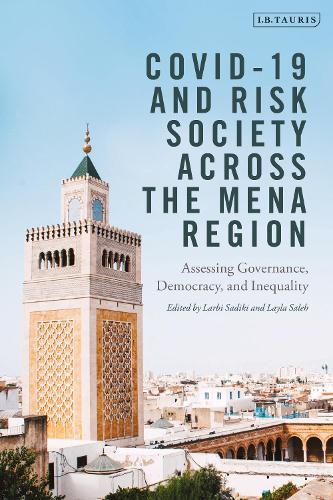
COVID-19 and Risk Society across the MENA Region: Assessing Governance, Democracy, and Inequality
(Hardback)
Available Formats
Publishing Details
COVID-19 and Risk Society across the MENA Region: Assessing Governance, Democracy, and Inequality
By (Author) Larbi Sadiki
Volume editor Layla Saleh
Bloomsbury Publishing PLC
I.B. Tauris
12th January 2023
United Kingdom
Classifications
Tertiary Education
Non Fiction
362.19624144
Physical Properties
Hardback
320
Width 164mm, Height 236mm, Spine 22mm
620g
Description
The impact of the COVID-19 pandemic at the interlocking levels of politics, economy, and society have been different across regions, states, and societies. In the case of the Middle East and North Africa, which was already in the throes of intense tumult following the onset of the 2011 Arab Spring, COVIDs blows have on the one hand followed the trajectory of some global patterns, while at the same time playing out in regionally specific ways. Based on empirical country-level analysis, this volume brings together an international team of contributors seeking to untangle how COVID-19 unfolds across the MENA. The analyses are framed through a contextual adaptation of Ulrich Becks famous concept of risk society that pinpointed the negative consequences of modernity and its unbridled capitalism. The book traces how this has come home in full force in the COVID-19 pandemic. The editors, Larbi Sadiki and Layla Saleh, use the term "Arab risk society". They highlight short-term and long-term repercussions across the MENA. These include socio-economic inequality, a revitalized state of authoritarianism challenged by relentless democratic struggles. But the analyses are attuned to problem-solving research. The "ethnographies of the pandemic" included in this book investigate transformations and coping mechanisms within each country case study. They provide an ethically-informed research praxis that can respond to the manifold crises crashing down upon MENA polities and societies
Reviews
In the Middle East and North Africa, the COVID-19 pandemic has compounded the political, economic, and societal fissures that contributed to and were exacerbated by the Arab revolutions and counterrevolutions. In this highly recommended volume, editors Larbi Sadiki and Layla Saleh offer a fascinating examination of the pandemics impact on citizens, refugees, and migrant workers. The editors and contributors admirably offer suggested reforms for a more just and equitable post-pandemic MENA region. * Osamah F. Khalil, Associate Professor, Syracuse University, USA *
Author Bio
Larbi Sadiki is Professor of Arab Democratization. He is editor of Routledge Studies of Middle Eastern Democratization and Government, and Editor-in-Chief of the journal PROTEST. He is director of the Tunis-based Democratic Sustainability Forum (Demos). He is currently Senior Fellow at the Middle East Council on Global Affairs, Qatar. Layla Saleh is Associate Professor of International Affairs at Qatar University, Qatar and Associate Editor of the journal PROTEST. She is co-founder of the Democratic Sustainability Forum (Demos). Her publications include the book US Hard Power in the Arab World: Resistance, the Syrian Uprising, and the War on Terror (2017).
